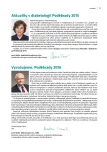-
Medical journals
- Career
Clinical aspects of pharmacological treatment of diabetic neuropathy – cooperation with neurologists and diabetologists
Authors: Denisa Janíčková Žďárská; Milan Kvapil
Authors‘ workplace: Interní klinika 2. LF UK a FN Motol, Praha
Published in: Vnitř Lék 2016; 62(3): 183-185
Category: Reviews
Overview
The development and progression of symptomatic diabetic neuropathy (SDN) is linked to hyperglycemia. The effort to improve compensation of diabetes mellitus during therapy is therefore very important. This is where the cooperation between the diabetologist and neurologist within therapy plays an important role. The pharmacological therapy of symptomatic sensitive peripheral diabetic neuropathy is difficult and with a less than satisfactory effect. A variety of active substances is used in symptomatic therapy, primarily designed for intervention in other pathological conditions. The recommended guidelines include antidepressants, anticonvulsants, opiates and their derivatives. However this therapy brings with it a relatively high incidence of adverse effects which detract from patients’ adherence to treatment. Very good results are reached by the therapy with thioctacid.
Key words:
adverse side effects – diabetic neuropathy – therapy of diabetic neuropathy – thioctacid
Sources
1. Hughes RA. Peripheral neuropathy. BMJ 2002; 324(7335): 466–469.
2. Tesfaye S, Boulton AJ, Dickenson AH. Mechanisms and management of diabetic painful distal symmetrical polyneuropathy. Diabetes Care 2013; 36(9): 2456–2465.
3. Doporučené postupy pro diagnostiku a léčbu diabetické retinopatie – aktualizace 2011. Dostupné z WWW: http://www.diab.cz/standardy.
4. Ziegler D, Hanefeld M, Ruhnau KJ et al. Treatment of symptomatic diabetic peripheral neuropathy with the anti-oxidant alpha-lipoic acid. A 3-week multicentre randomized controlled trial (ALADIN Study). Diabetologia 1995; 38(12): 1425–1433.
5. Ziegler D, Nowak H, Kempler P et al. Treatment of symptomatic diabetic polyneuropathy with the antioxidant alpha-lipoic acid: a meta-analysis. Diabet Med 2004; 21(2): 114–121.
6. Kvapil M. Postavení fixní kombinace antidiabetik v terapii. Remedia 2013; 23(4): 266–269.
7. Paes AH, Bakker A, Soe-Agnie CJ. Impact of dosage frequency on patient compliance. Diabetes Care 1997; 20(10): 1512–1517.
8. Donnan PT, MacDonald TM, Morris AD. Adherence to prescribed oral hypoglycaemic medication in a population of patients with Type 2 diabetes: a retrospective cohort study. Diabet Med 2002; 19(4): 279–284.
9. Deli G, Bosnyak E, Pusch G et al. Diabetic neuropathies: diagnosis and management. Neuroendocrinology 2013; 98(4): 267–280.
10. Ziegler D, Low PA, Litchy WJ et al. Efficacy and safety of antioxidant treatment with α-lipoic acid over 4 years in diabetic polyneuropathy: the NATHAN 1 trial. Diabetes Care 2011; 34(9): 2054–2060.
Labels
Diabetology Endocrinology Internal medicine
Article was published inInternal Medicine

2016 Issue 3-
All articles in this issue
- Obesity paradoxes
- Clinical aspects of pharmacological treatment of diabetic neuropathy – cooperation with neurologists and diabetologists
- Pharmacogenetics of oral antidiabetic treatment
- Cholesterol metabolism in patients with type 2 diabetes
- Victoza changes diabetes and lives of patients 5 years already
- XIGDUO – fixed combination of the active ingredients dapagliflozin and metformin
- Diabetes mellitus and pancreas cancer
- Early detection of ISHD in diabetic patients and determining the type of treatment
- What is the significance of the phenomenon of hypertension in disguise in patients with type 2 diabetes mellitus treated for long-lasting hypertension?
- Management of type 2 diabetes mellitus therapy in a mature age
- Motor vehicle driving and diabetes mellitus – medical aspects
- Motor vehicle driving and not only diabetes mellitus – certain aspects of the legislations in the Czech Republic
- “Healthy behaviour” and mental resilience in youth within the Diateens project
- Internal Medicine
- Journal archive
- Current issue
- Online only
- About the journal
Most read in this issue- Victoza changes diabetes and lives of patients 5 years already
- Motor vehicle driving and diabetes mellitus – medical aspects
- Diabetes mellitus and pancreas cancer
- Obesity paradoxes
Login#ADS_BOTTOM_SCRIPTS#Forgotten passwordEnter the email address that you registered with. We will send you instructions on how to set a new password.
- Career

